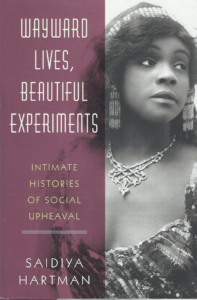 Saidiya Hartman’s highly anticipated new book, Wayward Lives, Beautiful Experiments: Intimate Histories of Social Upheaval (Norton, February 2019) wrestles with the question, “What is a free life?”
Saidiya Hartman’s highly anticipated new book, Wayward Lives, Beautiful Experiments: Intimate Histories of Social Upheaval (Norton, February 2019) wrestles with the question, “What is a free life?”
In the early twentieth century, young black women were in open rebellion. A social revolution unfolded in the city. Hartman’s book explores the ways young black women created forms of intimacy and kinship indifferent to the dictates of respectability, and outside the bounds of law. They cleaved to and cast off lovers, exchanged sex to subsist, and revised the meaning of marriage. Longing and desire fueled their experiments in how to live. They refused to labor like slaves or to accept degrading conditions of work. In Wayward Lives, Beautiful Experiments, Hartman narrates the story of this radical transformation of black intimate and social life, crediting young black women with shaping a cultural movement that transformed the urban landscape. Combining historical analysis and literary imagination, Hartman recovers radical aspirations and resurgent desires.